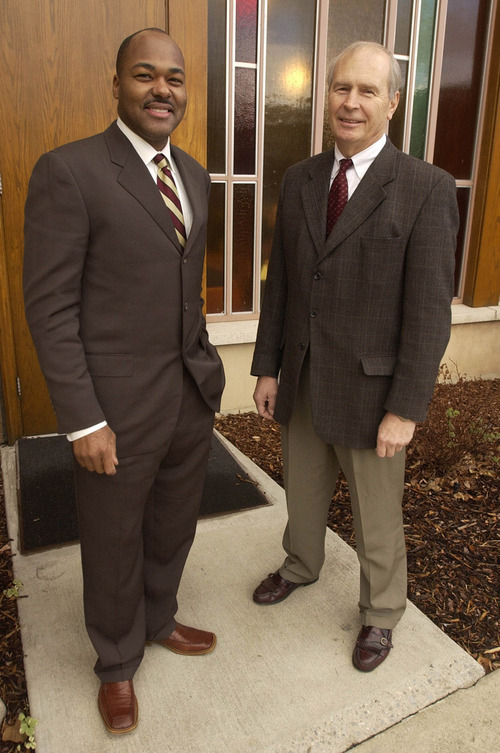This is an archived article that was published on sltrib.com in 2012, and information in the article may be outdated. It is provided only for personal research purposes and may not be reprinted.
On June 9, 1978, the LDS Church made a momentous announcement ending a longtime ban on blacks being ordained to its all-male priesthood.
Mormons across the world celebrated the news, delighted to see their Utah-based church allow full participation by members of every color and race.
A 31-year-old Mitt Romney was among those who cheered the change.
"I was driving home [from law school], going through the Fresh Pond rotary in Cambridge, Mass.," Romney told NBC in 2007. "I heard it on the radio, and I pulled over and literally wept. Even to this day, it's emotional."
Romney's father, Michigan Gov. George Romney, had marched for civil rights alongside black activists and had walked out of the 1964 Republican convention to protest what he saw as Barry Goldwater's weak defense of blacks.
Mitt Romney told NBC he believed that "God is no respecter of persons."
Since that day, the LDS Church has sent missionaries across the nation and globe, converting thousands and thousands of blacks, even as it struggled with persistent racist ideas within the faith — mostly built on some unofficial doctrinal explanations used to buoy up the ban.
Now, according to a new survey, racism within Mormonism seems to be on the wane — or at least no worse than other faiths. That could be due, in part, to changing times and strong statements from LDS leaders.
In one of his last speeches, the late LDS President Gordon B. Hinckley said that "racial strife still lifts its ugly head."
"I cannot understand how it can be," Hinckley said in April 2006. "It seemed to me that we all rejoiced in the 1978 revelation given [LDS Church] President [Spencer W.] Kimball. … Now I am told that racial slurs and denigrating remarks are sometimes heard among us. I remind you that no man who makes disparaging remarks concerning those of another race can consider himself a true disciple of Christ. Nor can he consider himself to be in harmony with the teachings of the church of Christ."
In February, the LDS Church strongly condemned notions — described by Brigham Young University religion professor Randy Bott in a Washington Post story earlier this year — about blacks being descendants of the biblical Cain or being "fence-sitters" in the premortal existence.
Bott's comments, the church said, "absolutely do not represent the teachings and doctrines of The Church of Jesus Christ of Latter-day Saints."
It went on to say that "the church's position is clear — we believe all people are God's children and are equal in his eyes and in the church. We do not tolerate racism in any form."
Some argue top Mormon leaders must go further and apologize for the priesthood prohibition.
"If the LDS Church were to apologize, that would be casting aspersions on God's prophets — the voice of God on Earth," Richard Ostling, co-author of the book Mormon America, told Religion News Service earlier this year. "I don't think the Mormon soul could countenance it."
Still, a recent online survey of black and white Mormons by LDS social scientist Darron Smith shows the church's statements may be having an effect.
In the unscientific survey, "Mormon Beliefs About People of African Descent," most of the 760 participants (70 percent) said the idea that "black people were cursed descendants from Cain/Ham" is not official LDS doctrine. About 90 percent of Republican respondents and 60 percent of Democrats said "current LDS teachings are not racist."
Of the 100 or so black Mormons surveyed, 54 percent said the faith's teachings were "becoming less racist." Twenty-four percent of them said Mormons they have known have behaved better than others toward black people and other minorities.
Smith, who teaches at Wichita State in Kansas, is working with the Mormon Research Foundation to expand the pool of respondents.
"Attitudes are changing," Smith says. "The church could help that along by saying something without waiting for a Randy Bott episode. LDS Church leaders could make the experience more palatable for ordinary rank-and-file black Americans who would otherwise not consider Mormonism as an option."
Black Americans who join the church tend to be educated, upwardly mobile and used to being around whites in predominantly white settings, he says. The faith has less success reaching working-class blacks.
In Africa, however, LDS membership since ending the priesthood ban — though still tiny — is skyrocketing.
As someone who is deeply concerned about the future of the church and African-Americans, Smith is "hopeful."
Web survey
To take part in social scientist Darron Smith's online survey — "Mormon Beliefs About People of African Descent" — go to http://tinyurl.com/chhpuju.



